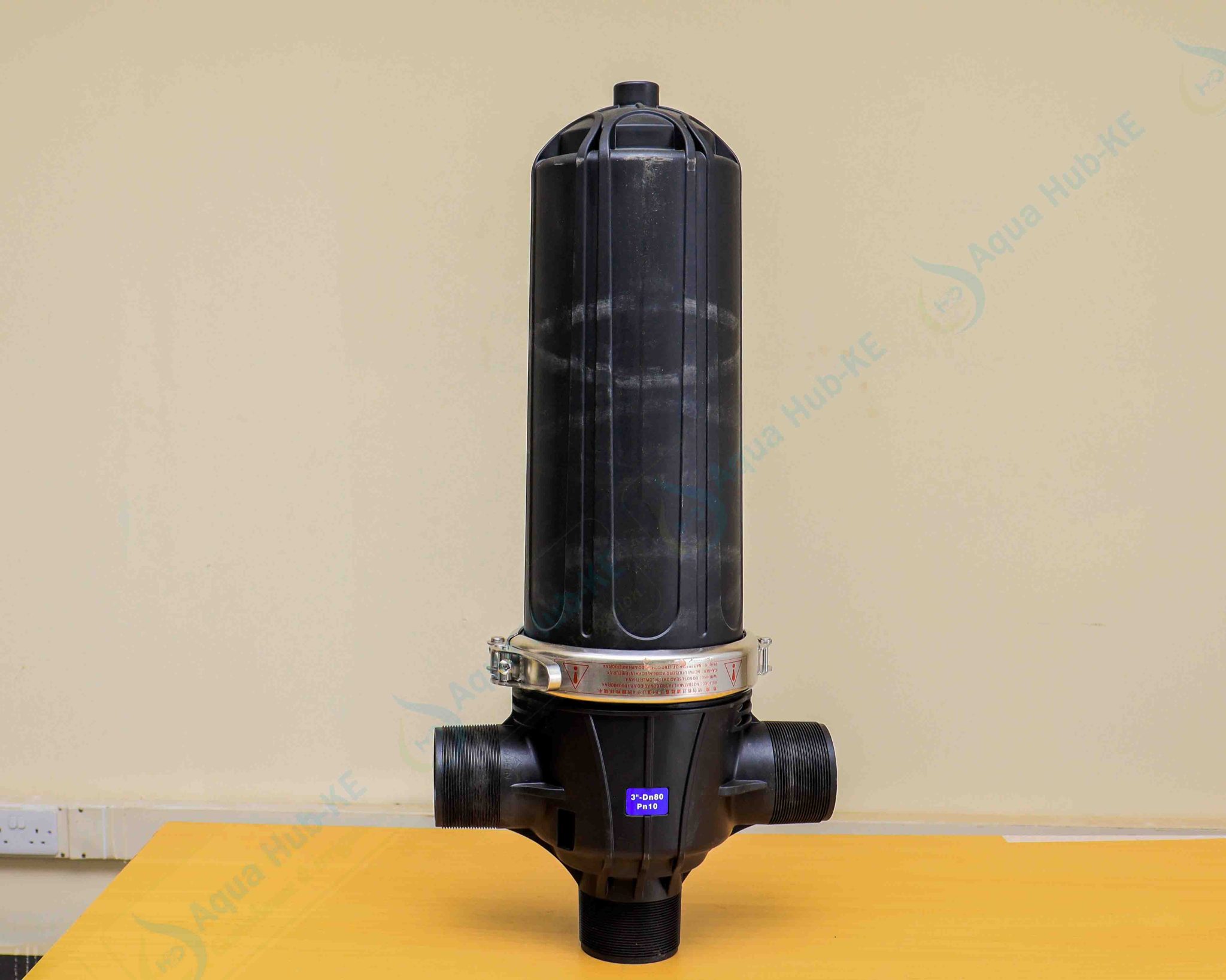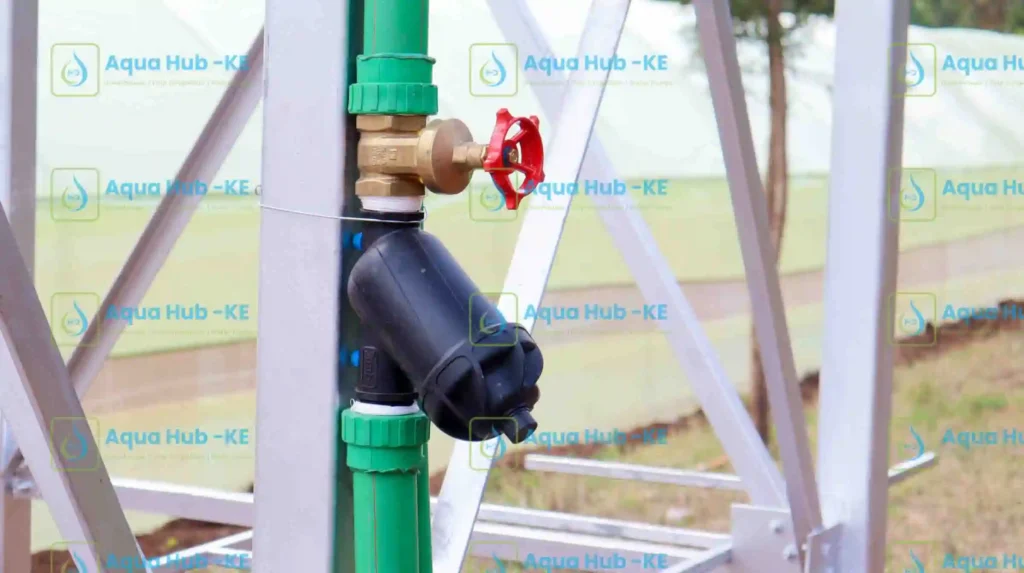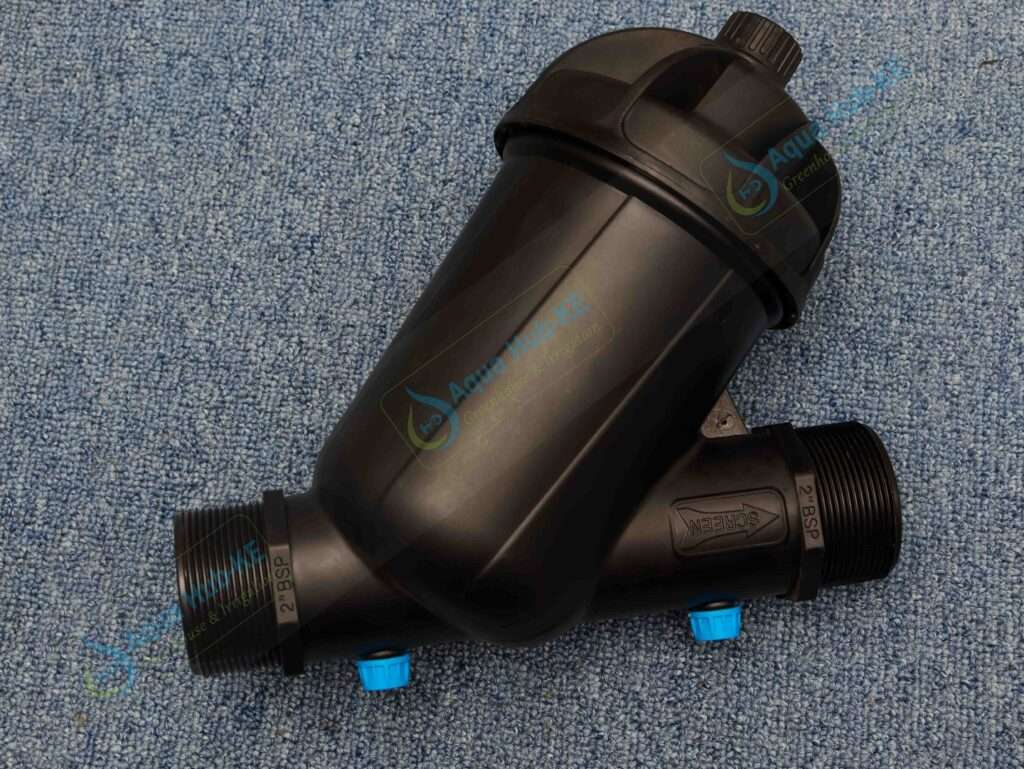Blog
Irrigation Filters | Best Prices in Kenya 2025

Irrigation Water filters remove solid particles such as sand, silt and debris from irrigation water in drip, sprinkler or rain hose systems. These water filtration devices are often installed near the water source to prevent clogging of pipes, nozzles or emitter pipes in irrigation systems.
Aqua Hub LTD, being a top irrigation company in Kenya, recommends use of quality screen and disc filters in irrigation systems. We have affordable irrigation water filters sourced from top manufacturers of irrigation accessories in the world.
Irrigation Filters Price in Kenya
The cost of irrigation water filters in Kenya is between KES 1000 to KES 14,500 depending on the size and type of the filter. Disc filters are more expensive compared to screen filters due to their high efficiency.
Why Irrigation Filters are Essential
Water for irrigation is often sourced from dirty water sources including rivers, dams or harvested water in ponds. While borehole water could be clean, some borehole water could still contain sand or soil particles. Leaving these particles unfiltered could pose a risk to your irrigation system as it may affect water distribution. The major challenge is the drying of crops which occurs when water flow is stopped by sediments clogging the system.
Water filtration also removes algae present in water sources and prevents it from blocking pipes. Removal of debris and sediments ensure normal flow rate and pressure of water thus preventing pipe damage. Therefore, the system will work effectively and enhance long-lasting performance.
Types of Irrigation Filters in Kenya
Screen Filters
The most popular and affordable type of irrigation water filter. Often reliable for removing particles such as sand or silt. They don’t work effectively for organic matter such as algae, mold or slime.
Specifications of Screen Filters
- Has mesh size of 150 microns
- Available in sizes of ¾”, 1”, 1.25”, 1.5”, 2”
- Made of UV resistant body plastic material.
How to Clean Screen Filters
To clean a screen filter, you first close the gate valves to stop the water supply, open it to remove the screen and clean by hand.
Advantages of Screen Water Filters
- Affordable – comes at lower cost compared to disc, hydro clone or sand filters
- Small Compact design – takes smaller space in the system.
- Threaded connection – has threaded ends for easier connection to irrigation pipes.
- UV treated material – design made of UV resistant Polypropylene plastic.
Disc Filters

Disc filters are designed to remove debris, organic matter, sand and other particles from irrigation water and prevent clogging. The disc filters consist of grooved discs stacked to form cylindrical layer of filter that traps tiny sediments and organic matter.
Specifications of Disc Filters
- Has mesh size of 150 microns
- Available in sizes of ¾”, 1”, 1¼”, 1½”, 2”
- Made of UV resistant polypropylene material.
How Disc Filters Work
Water passes through a disc cartridge, which is a set of stacked grooved discs and particles remain trapped outside the disc cartridge.
Advantages of Disc Filters
- Highly efficiency of filtration – removes sediments effectively due to their multiple layers of discs. Small sediments are separated from irrigation water.
- Compact design – it has a compact and portable design which require smaller space unlike sand or hydro clone filters.
- Easier to maintain – due to their backwashing or self-flushing mechanism it is easier to maintain them.
- Versatile applications – Wide range of uses in industrial, irrigation and water systems.
Media Filters
Media Filters are the most effective due to their highest degree of filtration compared to other types of filtration systems. Often popular choice for large irrigation systems where dirty water is used. These filtration devices trap very fine sand particles.
Hydro clone Filter
Type of device used before a filtration system to remove sand from ground water extraction.
Uses a centrifugal force to separate sand from water.
What to Consider when Choosing Irrigation Filters
- Mesh size – the size of particles determines the mesh size to use. for water with fine particles use a high mesh filter. Drip irrigation system requires 150-micron mesh filter.
- Size of filter – filter size determines the water flow rate it can filter at a unit time. Often available in ¾ to 2-inch sizes.
- Source of Water – for water sources with high sand or sediment level, disc or sand filters are best.
- Pressure requirement – the pressure requirement of the system determines what size of the filter to use.
- Flow rate – mind the flow rate of irrigation filter to ensure it does not affect the flow rate of the irrigation system.
- Type of irrigation system – irrigation system type determines the filter to use. sprinklers use tiny nozzles and thus require effective filters such as discs. Drip kits can use both screen and disc filters.
- Size of the irrigation system – large irrigation system for large farms requires large filters and sometimes advanced filtration systems to handle large flow rates of water.
- UV resistance – often filters will work on the open environment exposed to cold and hot sunlight radiation. Always consider filters designed from UV resistant and non-corrosive material for long lasting performance.
Applications of Irrigation Filters
- Irrigation – water filtration systems are used to filter sediments and prevent irrigation system from clogging.
- Water treatment – automatic disc filters are used for water treatment in municipal treatment plants.
Benefits of Using Water Filters in Irrigation
- Prevents Irrigation System from Clogging: By removing sediment and other debris, filters prevent clogging in pipes and sprinklers, saving farmers time and money on repairs.
- Improves Water Quality: Clean water is free from minerals and salts that often results in leaching and soil contamination. It thus benefits crop health and yield.
- Protects Equipment: Filters safeguard irrigation equipment from damage caused by pipe clogging.
- Enhance Efficiency: With filters, irrigation systems operate more efficiently, ensuring uniform water distribution.


